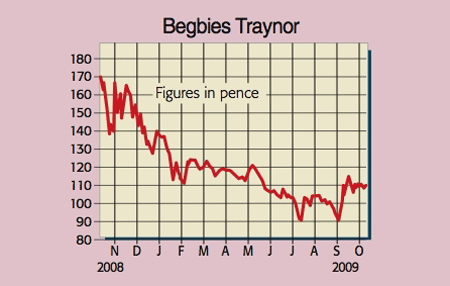Get the latest financial news, insights and expert analysis from our award-winning MoneyWeek team, to help you understand what really matters when it comes to your finances.
You are now subscribed
Your newsletter sign-up was successful
Want to add more newsletters?

Twice daily
MoneyWeek
Get the latest financial news, insights and expert analysis from our award-winning MoneyWeek team, to help you understand what really matters when it comes to your finances.

Four times a week
Look After My Bills
Sign up to our free money-saving newsletter, filled with the latest news and expert advice to help you find the best tips and deals for managing your bills. Start saving today!
Take a stroll down any British high street and the chances are that one in eight shops will be boarded up or vacant. That's due to the current economic malaise, which has already claimed many high-profile victims, such as MFI, Woolworths and music chain Zavvi.
Indeed, as a consequence of the meltdown in discretionary spending, many debt-laden firms are struggling to stay afloat, with a record 30,000 businesses expected to go into administration this year. It's not surprising then that "activity levels" at Begbies Traynor, the UK's leading independent insolvency and restructuring specialist (80% of sales), are strong.
However, given these near-perfect conditions, what's slightly puzzling is how badly the stock has performed over the past 12 months: it has dropped over 40%.
MoneyWeek
Subscribe to MoneyWeek today and get your first six magazine issues absolutely FREE

Sign up to Money Morning
Don't miss the latest investment and personal finances news, market analysis, plus money-saving tips with our free twice-daily newsletter
Don't miss the latest investment and personal finances news, market analysis, plus money-saving tips with our free twice-daily newsletter
The main reason is that it typically takes six to nine months for a receiver to be paid after a firm goes bust hence Begbies' trade debtors have jumped to £40.4m (from £29.6m) as the division has expanded at break-neck speed. Now, although it's always better to have money you are owed in your pocket, I suspect the fears over negative cash flow are overdone.
Begbies Traynor Group (Aim: BEG)

The firm is one of the first creditors to be paid in the event of a liquidation and so it's unlikely that any of this type of debt will turn bad. That said, net debt rose to £17.5m at the end of April and so, to fund growth, Begbies was forced to raise £13m in October 2008 at 165p per share.
The other big concern has been its non-insolvency divisions tax and corporate finance which account for 20% of sales. These have experienced tough times during the slump. Begbies advises on deals in the £2m to £20m range, but capital constraints have meant mergers and acquisitions activity, and related tax work, has been suffering. Nonetheless. the firm is still doing very nicely.
The City is pencilling in 2009/2010 revenues and underlying earnings per share of £69.4m and 9.0p respectively, rising to £77m and 10.2p one year later. This puts the stock on undemanding p/e ratios of 12.3 and 10.8, with a 2.5% dividend yield. I'd value the stock on a ten-times operating profit multiple, which generates an intrinsic worth of around 140p per share. Overall, with the UK economy still on a knife edge, and restructuring work set to remain healthy long after the recession has ended, Begbies looks a good counter-cyclical play.
Recommendation: speculative BUY at 110p (market capitalisation £98m)
Paul Hill also writes a weekly share-tipping newsletter, Precision Guided Investments
Get the latest financial news, insights and expert analysis from our award-winning MoneyWeek team, to help you understand what really matters when it comes to your finances.
Paul gained a degree in electrical engineering and went on to qualify as a chartered management accountant. He has extensive corporate finance and investment experience and is a member of the Securities Institute.
Over the past 16 years Paul has held top-level financial management and M&A roles for blue-chip companies such as O2, GKN and Unilever. He is now director of his own capital investment and consultancy firm, PMH Capital Limited.
Paul is an expert at analysing companies in new, fast-growing markets, and is an extremely shrewd stock-picker.
-
 Early signs of the AI apocalypse?
Early signs of the AI apocalypse?Uncertainty is rife as investors question what the impact of AI will be.
-
 Reach for the stars to boost Britain's space industry
Reach for the stars to boost Britain's space industryopinion We can’t afford to neglect Britain's space industry. Unfortunately, the government is taking completely the wrong approach, says Matthew Lynn